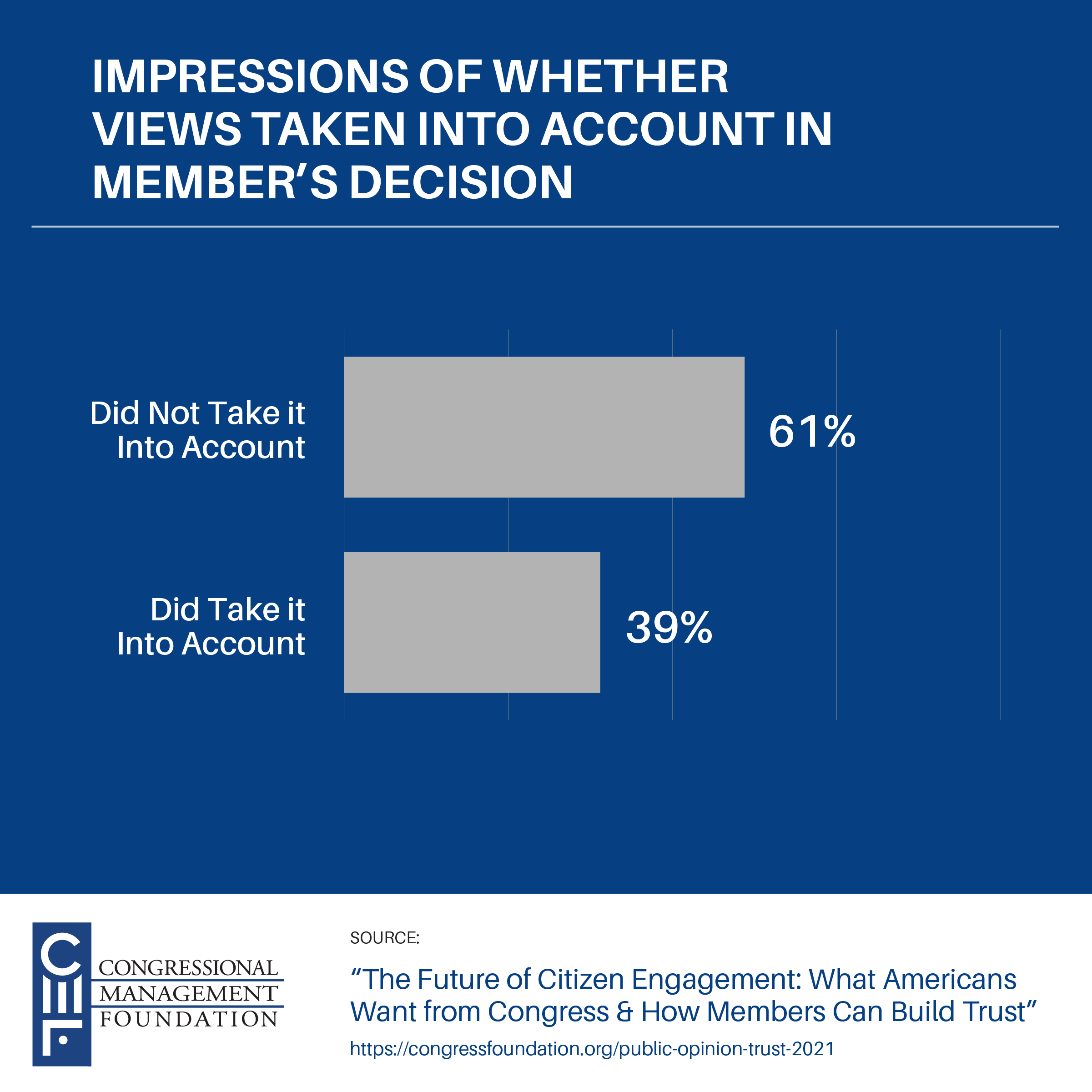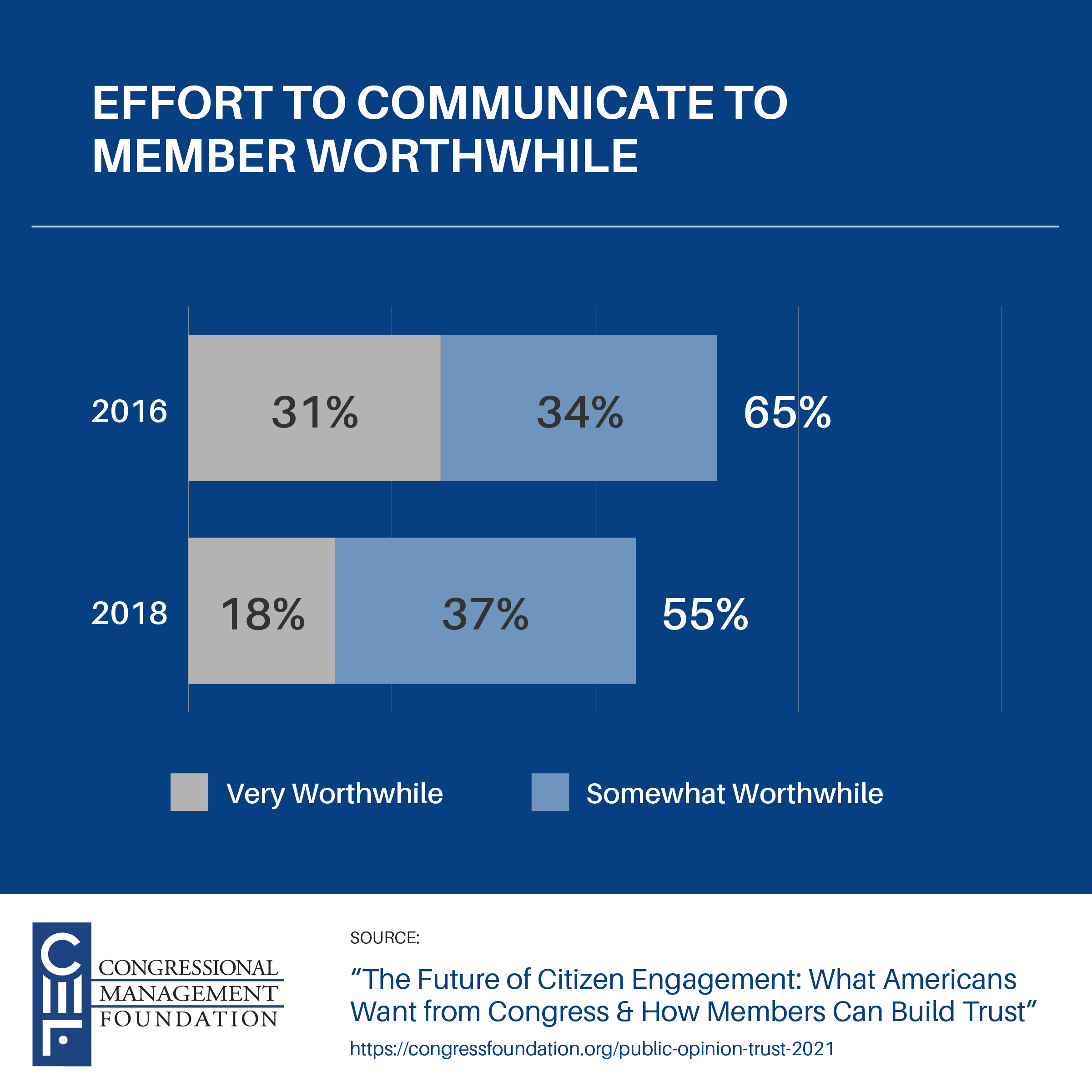This is the first in a series of weekly blog posts summarizing the findings in our latest report "What Americans Want from Congress & How Members Can Build Trust."
From 2015-2020, CMF collaborated with the Program for Public Consultation at the University of Maryland to ask national samples of registered voters about their interactions with their elected representatives in Congress. We wanted to gain a better understanding of what voters want and expect and what would improve their trust in Congress. One of the key findings from the surveys was that voters who contacted a Member of Congress tended not to be satisfied with the response they received. Unfortunately, they also believe that Congress is simply not taking their views, and the views of other constituents, into account when deciding on an issue.
When we asked survey respondents whether they had contacted one of their congressional representatives in the past five years to express their point of view on an issue, the responses were roughly split between those who said they had (48%) and those who said they had not (51%). Those who had were then asked a series of follow-up questions to better understand their impressions of the experience.
When asked if they had received a response, the majority (64%) indicated they had, but about one-third (35%) said they had not. Whether or not they received a response, the majority felt their views were not considered by their Member of Congress. More than half of those who had sent a message had the impression that their views, together with the views of other citizens, were not even communicated to their congressional representative, and 61% had the impression their views were not taken into account in the Member's decision on what position to take.
When we asked survey respondents whether they had contacted one of their congressional representatives in the past five years to express their point of view on an issue, the responses were roughly split between those who said they had (48%) and those who said they had not (51%). Those who had were then asked a series of follow-up questions to better understand their impressions of the experience.
When asked if they had received a response, the majority (64%) indicated they had, but about one-third (35%) said they had not. Whether or not they received a response, the majority felt their views were not considered by their Member of Congress. More than half of those who had sent a message had the impression that their views, together with the views of other citizens, were not even communicated to their congressional representative, and 61% had the impression their views were not taken into account in the Member's decision on what position to take.
 In the end, however, more than half of the respondents (55%) felt their effort to communicate was very (18%) or somewhat (37%) worthwhile. Unfortunately, these percentages were significantly lower than when we asked the same questions of registered voters in 2016, two years previous. The earlier poll showed that nearly two-thirds (65%) felt their effort to communicate their views to their Member of Congress was very (31%) or somewhat (34%) worthwhile.
In the end, however, more than half of the respondents (55%) felt their effort to communicate was very (18%) or somewhat (37%) worthwhile. Unfortunately, these percentages were significantly lower than when we asked the same questions of registered voters in 2016, two years previous. The earlier poll showed that nearly two-thirds (65%) felt their effort to communicate their views to their Member of Congress was very (31%) or somewhat (34%) worthwhile.
Questions like these are subjective, relying on memories and sentiment that can be influenced by external factors such as negative associations with Congress, in general. We report them because the trends—subjective or not—are telling. They are indicators of a breakdown in the relationship between Members of Congress and those they represent—yet voters still appear hopeful about the value of their democratic communications.
A key takeaway: Constituents need to feel they are being heard by their representatives in Congress, and elected officials need to better communicate their actions/views so that Member-constituent relationships and trust improve.
Hanzell Carrillo is a senior at Nazareth College majoring in Political Science. He is CMF's Research Assistant intern for Spring 2021.


